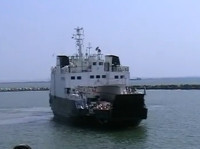China breathes fire on Ukraine's Crimea
The Chinese are interested in a former Soviet health resort that used to be the most popular tourist destination during the times of the USSR. Chinese investors will come to the Crimea with a plan to build a deep-water port in the Black Sea for redistribution of the cargo coming from the East to Europe. Thus, the "Crimea" port will become a major hub on the route of the new Silk Road, bypassing Russia.

Considering the geographical location of the Crimea that lies on the path of the Eurasian flow (goods coming from the east, and in particular, from the booming China), one can imagine the importance of the autonomous republic in world trade. The potential of this trade route is confirmed by the global statistics numbers provided by a Ukrainian news agency citing the head of the project Alexey Mazyuk. According to the data, in 2011 the volume of traffic of goods going into the European market was $1.1 trillion dollars, but it is not the limit. Volumes of goods from the east will grow continuously, and the average increase is estimated at 10 percent per year.
Thus, the Crimea will likely see capital inflows and host a huge hub on cargo redistribution. Perhaps, it will be able to solve the problems inherent in most of the coastal towns and villages of the former Soviet territory, namely, shortage of jobs, poverty, fiscal deficits, and so on. Considering that over 27 percent of the Crimea population lives below the poverty line, the major port looks like a goldmine.
"Any project that will increase the freight or passengers flow (in this case, most likely, freight) is naturally advantageous for any region, because it always generates a large number of smaller service projects, and the hub itself, of course, will generate additional profits," told Pravda.Ru vice president of "Russia's Support" Mikhail Mamut.
Not surprisingly, the new hub was designed by a Ukrainian company "Kievgidroinvest." The company's design was presented in Beijing, and Chinese company Beijing Interoceanic Canal Investment Management Co., Ltd took the bait. The company is known for its investment in a navigable canal in Nicaragua. It is understandable, as the Crimea is no worse than Nicaragua, but even better on all counts (at least territorial ones). The project already signed in Beijing provides for the public-private partnership with the state share of 50 percent.
The deep water port "Crimea" with underwater area of 25 meters will be built near the village of Frunze in Saki region of the Crimea. Since the port infrastructure and port itself will be built on land, the builders will have to destroy the land separating the Bogayly Lake from the sea. The navigable channel for the passage of the largest vessels will stretch for 9 kilometers. It is expected that the total turnover of the port will be at least 140 million tons a year. Apparently, the Ukrainians' project turned out to be very interesting. What potential do the cunning Chinese see in this project?
"For the Chinese it provides a new basis for consolidation. The Chinese are now investing in infrastructure virtually anywhere in the world, anywhere they can," said Mikhail Mamut. "Chinese investments in Africa are likely dominant if we talk in terms of volume. In many African countries China is generally number one investor; the Chinese are also very active in Central Asia. On the territory of the western outskirts of the CIS they are not that apparent so far. For China, it is first and foremost a good opportunity to gain a foothold in the region. On the other hand, the project is definitely interesting. The general logic of the Chinese is absolutely clear - this is a long term infrastructure project with plenty of potential. Such projects are great for investment when you have a long-term goal. The goal, from the point of view of infrastructure projects, is an opportunity to strengthen the influence on other projects in the region."
In addition, this port will be part of the project of recreating the Great Silk Road initiated by the Chinese President and recently supported by the president of Ukraine Viktor Yanukovych during his visit to Beijing.
"Recently, maybe two weeks ago, the People's Daily Newspaper published two articles about the creation of the Great Silk Road from China through Central Asia, through the South Caucasus and the Black Sea to Europe. The name of the Great Silk Road stems from the desire to give it historical significance, but in fact it is the path that must directly link China and European countries, especially the countries of Southern Europe. I have only read about it, but I understand that Mr. Yanukovych needs investment and the money now," shared her opinion head of department of the Black Sea and Mediterranean Sea Studies Institute of Europe RAS Alla Yazykova. "He is selling a part of Sevastopol. I would say that for Russia this development is not particularly comfortable. The Great Silk Road is bypassing Russia through Central Asian countries with which China has a rather close relationship. It has weaker ties with the Caucasus, obviously. But, nevertheless, this Road will continue, and this deep-water port, in my opinion, may have this significance here."
Indeed, in addition to the agreement on the construction of a deep water port "Crimea," an agreement to invest in the reconstruction of a fishing port in Sevastopol by the Chinese was signed in Beijing. The total cost of the project is at least $3 billion. Incidentally, Sevastopol hosts the Black Sea Fleet, and will host it at least through the spring of 2017.
Nevertheless, according to Mikhail Mamut, the Chinese investment will come very handy for the Crimea because the infrastructure is not very well developed in the Black Sea from the Crimean side. The only negative thing for the autonomous republic is an ecological risk. While Mazyuk named many positive aspects, including eco-friendly latest technology, social projects for the benefit of local residents, environmental projects such as new beaches, sewage treatment plants, and moving the Evpatorian port outside the city, the possible losses from the implementation of the projects for the Crimea residents are not yet clear.
Maria Snytkova
Pravda.Ru
Subscribe to Pravda.Ru Telegram channel, Facebook, RSS!




